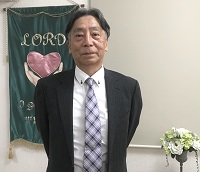↓Audio link to the sermon:(1st worship recording)
(If you can’t listen on your iPhone, please update your iOS)
① In today’s passage, one of the religious leaders at that time approached to Jesus with a malicious intentions thinking, “Let’s test Him!”
・ This religious leader was an expert of the Old Testament.
He asked Jesus, “Teacher, what must I do to inherit eternal life?”
・ Since this question is straightforward, it sounds like a good question at first glance.
However, if you look carefully at the contents of this question, we can see the twisted perspective that the religious leaders had at that time.
・ Here, he first said, “What must I do…?”.
・ From this phrase, we can see that his view of faith is very different from that of modern pastors. Apparently, he thought we need our daily deeds to be accepted by God.
・ After that, he said “to inherit”, which also shows the value of ancient Israelites’ religious leaders.
・ In other words, they believed the faith is something that we inherit. They put so much value on bloodline and being God’s chosen people.
・On the other hand, Jesus did not say anything judgmental like “You don’t understand. Your question miss the point!!”
・ Instead, He asked him back, “What is written in the Law? How do you read it?” (Verse 26)
・ Since he was an expert in the Old Testament, he must have had a confidence in debating, so he was probably glad that Jesus asked him back.
・ So he replied in confidence, “Love the Lord your God with all your heart and with all your soul and with all your strength and with all your mind’; and, ‘Love your neighbor as yourself.’”
・He was such an expert that he brilliantly summarized the Old Testament in two verses and replied confidently. Everyone thought it was a perfect answer.
・However, if we pay more attention to his answer, we can see that it wasn’t perfect, it didn’t cover the whole question that Jesus asked.
・ Jesus asked two questions here, and he only covered the half of them.
・ He proudly answered to the first question, “What is written in the law?”
In other words, he only answered the question, “What is written in the Old Testament?”
・ Because he was an expert, he was good at answering questions about what is written in the Bible. So he was able to answer the first question brilliantly.
・ However, if you think about this…Does it have a religious value on having that kind of knowledge?
・ Honestly, I believe just having that knowledge doesn’t have much value.
・ On the contrary, there are many harmful effects on just having Biblical knowledge.
・ One of them is not to listen to the word of God when we think we know the Bible really well.
・ Therefore, I believe It is quite dangerous to start thinking “I know the Bible really well.” It is because that kind of attitude makes us prideful and it prevents us from listening to the word of God carefully.
・ What is even more dangerous is that knowledge becomes a substitute for faith, meaning that knowledge replaces with faith.
・ The important thing is how each person reads the word of the Bible… This is the key point. However, he did not answer that part of question asked by the Lord Jesus Christ.
・ The reason why he was silent on this question was, I guess it was hard for him to say “I am reading this passage just as my knowledge.” Or “I read the Bible just as a textbook of life.” Or even “I’m not reading the Bible to put into practice in my life.”
・ I believe this person was such an intelligent man, so he was probably aware of the fact that he was answering only a half question asked by Jesus. He must have been very restless, thinking “I hope Jesus doesn’t notice that I am answering only a half of his questions.”
・ Jesus replied “You have answered correctly,” then he added, “Do this and you will live.”
② The Old Testament expert who heard this word probably became upset, thinking “Oh no, Jesus noticed my weaknesses, I will lose this argument.”
・ And to hide what was in his heart, he asked Jesus back, “And who is my neighbor?”
・ He wanted to distract Jesus’ attention with his question so that he might be able to maintain his advantage.
・ Luke wrote about this man’s situation as, “he wanted to show that he was right.” which could be quite incisive analysis. In The New Inter-confessional Translation, this passage is translated as “he wanted to justify himself.”
・ The author, Luke, was a very insightful doctor, so he knew what was in his heart and described in verse 29,「But he wanted to justify himself, so he asked Jesus, “And who is my neighbor?”」(Luke 10:29 NIV)
・ As it says, “he wanted to justify himself”, we also speak out with this kind of motives sometimes, which we should be careful about.
・ But Jesus didn’t interrupt the question of this Old Testament expert. Instead, he started telling the later become one of the most encouraging parables, “the Good Samaritan”.
・ The summary of this famous parable is, as a man traveling from Jerusalem to the city of Jericho, which was quite dangerous road, he was attacked by robbers. They stripped him of his clothes, beat him and left him half dead.
・ As the man was lying down on the side of the road, a priest happened to be going down the same road. The man expected this priest to save him, but he saw the man, passed by on the other side.
・ The next person who passed was a Levite, who was considered people of high birth.
In Japan, they are like people of the Emperor’s lineage. However, he did the same as the priest, passing by the other side of the road.
・ The next person who passed was a Samaritan. The Israelites looked down on them and no one had interaction with them. However, he acted different than the other two. He saw him, took pity on him, bandaged his wounds, pouring on oil and wine. Then he put the man on his own donkey, brought him to an inn and took care of him.
・ The next day, this Samaritan gave the innkeeper about 20,000 yen with modern money worth and said, “Look after him, and when I return, I will reimburse you for any extra expense you may have.”
③ By the way, have you ever heard of the law called “Good Samaritan Law”?
・ When we are on an airplane or Shinkansen, we sometimes hear an announcement like
“Are there any doctors among you? If so, please let us know. It is an emergency.” However, in reality, it seems that few doctors come forward under such circumstances.
・Then, why are there so few doctors who come forward? The biggest reason is that if they fail the emergency services, then that might put them in trouble such as being sued later. They start thinking about such risks, and that would prevent them from helping patients in such emergency.
・ The law of Good Samaritan is to prevent such circumstances.
The law states that the doctor cannot be punished even if they fail in such emergency.
・ The aim of this law is that they want doctors to challenge themselves in such emergency no matter what the result might be. It seems that the law has been enforced in Canada, the United States, and Austria, but it is still under consideration in Japan.
・ When both priest and Levite saw this man lying down half dead, they left him.
Of course they knew the importance of helping those who are in need. The reason why they didn’t help the man was because they didn’t want to take a risk.
・ The risk of bad things happening as a result of helping this man. If they help him and take him to the city, first of all, they have to cancel their plans. They might end up paying all of his medical expenses.
・ Since the man was half dead, the most horrible thing possible is him passing away on the way.
If that happens, he might be misunderstood that he killed this man. At least, he would end up taking some sort of responsibility on his death. Considering all of this, we can’t easily look down on those who pass by this man.
・ On the other hand, the Samaritan was able to take an action without hesitation. He did what was right thing to do. He challenged himself to help this man.
・Therefore, the law of the Good Samaritan is for protecting doctors by law to be like this Good Samaritan.
④ Let’s get back to the story to the Bible.
What is the main message that Jesus wanted to communicate through this parable with this Old Testament experts?
・ Because he was an Old Testament expert, he read the Bible more than anyone else, so he knew what the Bible says.
・Also, he knew that the summary of the Bible is, to love God with all our heart and with all our soul and all our strength and with all our mind. Specifically, to love our neighbor as we love ourselves.
・ However, just knowing the message of God doesn’t mean anything. It stats having a meaning only when we put ourselves in the action of love. That is what Jesus was communicating through this parable.
・ This Bible expert had enough knowledge of what it means to love God. But did he put into practice to love God in his life? The answer was no.
・Some of you might think, since he had lots of knowledge about Bible, only thing he should do is to start doing it. Unfortunately, he only kept that knowledge in his head.
・ If we put this into more casual setting, he is like a person with knowledge that Ramen in the particular shop is so delicious, yet he never actually tried that Ramen. Only as knowledge he knew the goodness of the shop yet he never tried that.
・ Why did he become a person who only had knowledge about loving God? Jesus showed the original cause of why he became like that.
・In verse 26, Jesus asked him a question, “How do you read it?”
・ As I mentioned earlier, he avoided answering that question.
・ For him, the Bible was only a subject of study. Unfortunately, he didn’t have intention to receive the word of God and apply it into his everyday life.
⑤ We are having worship service now, and we are opening up the Bible and reading it.
If you have a heart to receive the message of God, you would listen to this message deciding to apply it into your life.
・ But at the same time, we also have weakness just like the expert in today’s passage, that we sometimes read the Bible in the same way he read it.
・ Today, we would like to meditate on this word of Jesus, “You have answered correctly. Do this and you will live.”
• The Lord Jesus Christ encourages us in another passage, “You are the light of the world.” As the light, we would like to challenge ourselves to love our neighbors as we love ourselves.
(If you can’t hear from the bar above, click the blue button)
iPhone




